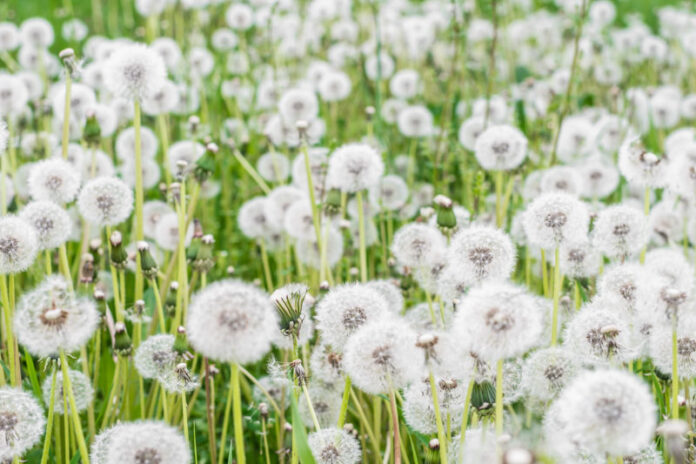Introduction

Dandelion (Taraxacum officinale) is a common herb that is often considered a weed, but its various parts, including the flowers, leaves, and roots, have been used for centuries in traditional medicine. The dried white flowers of the dandelion plant, specifically, are of particular interest for their unique medicinal properties. Although typically yellow when fresh, the dandelion flowers turn white as they mature and dry, and they offer a variety of health benefits when used in herbal preparations.
Forms of Dandelion White Flower
Dandelion flowers, including the white, dried variety, can be used in different forms. These forms allow the herb to be consumed, applied, or used in various herbal remedies. Here are some of the most common forms:

- Dried Flowers: Once the dandelion flower has matured and turned white, it can be harvested, dried, and used in teas, tinctures, or powders. Drying the flowers preserves their beneficial compounds, which can be extracted during preparation.
- Tea: Dandelion flower tea is one of the most popular ways to consume the dried flower. The dried petals and seeds are steeped in hot water to make a tea that is mildly bitter and slightly sweet. This tea is often enjoyed for its mild diuretic properties and detoxifying effects.
- Tincture: Dandelion flower tinctures are made by infusing the flowers in alcohol or another solvent. This concentrated extract can be used to promote digestion and stimulate the liver. Tinctures are a potent form and are typically consumed in small doses.
- Capsules and Tablets: Some herbal supplements offer dandelion flower in capsule or tablet form, making it easy to consume standardized doses of the herb for specific health purposes.
- Oil: Dandelion flower oil can be infused by steeping the flowers in a carrier oil like olive oil or coconut oil. This oil is used topically for skin care, particularly in soothing irritation and promoting healthy skin.
- Powder: Dandelion flower powder is another form that can be made from dried and crushed flowers. The powder can be added to smoothies, food, or capsules for supplementation.
Benefits of Dandelion White Flower
Dandelion flowers, especially in their dried form, offer several potential health benefits. These include:

- Rich in Antioxidants: Dandelion flowers are packed with antioxidants, which help combat oxidative stress in the body. Antioxidants can protect cells from damage caused by free radicals, which are linked to chronic diseases like cancer and heart disease.
- Support for Liver Health: Dandelion flowers have traditionally been used to support liver health. They may stimulate bile production, aiding in the digestion of fats and helping the liver detoxify. Some studies suggest that dandelion can support liver function and help prevent liver damage.
- Cancer Cell Growth Inhibition:
Some studies have suggested that dandelion root extract has the potential to inhibit the growth of cancer cells, particularly in cases of breast and colon cancer. The compounds found in dandelion may disrupt the growth and spread of cancer cells, though more human studies are needed. - Digestive Health: Dandelion flowers are thought to stimulate digestion by increasing bile flow and promoting appetite. They are often used to ease digestive discomfort, such as bloating, constipation, and indigestion.
- Anti-inflammatory Effects: The dried flowers contain compounds that may help reduce inflammation in the body. This can be beneficial for conditions such as arthritis or inflammatory bowel disease (IBD).
- Skin Health: Dandelion flower oil is often used for its skin-soothing properties. It may help reduce skin irritation, redness, and inflammation, and is sometimes used in natural skincare products for its ability to hydrate and restore skin.
- Immune System Support: The antioxidants and vitamins found in dandelion flowers can help boost the immune system, making it more effective at fighting infections.
Side Effects of Dandelion White Flower
While dandelion flowers are generally safe for most people, they may cause side effects in some individuals. It’s essential to be aware of these potential risks:

- Allergic Reactions: Some people may be allergic to dandelion, especially those who are allergic to related plants like ragweed, chrysanthemums, marigolds, or daisies. Symptoms of an allergic reaction may include skin rashes, swelling, or difficulty breathing.
- Diuretic Effects: While dandelion’s diuretic properties can be beneficial for some, they can also lead to dehydration if consumed excessively. It’s important to drink plenty of water when using dandelion as a diuretic to avoid electrolyte imbalances.
- Potential Drug Interactions: Dandelion may interact with certain medications, particularly diuretics, lithium, blood thinners, and drugs for diabetes. If you are on medication, it is crucial to consult with a healthcare provider before using dandelion flowers.
- Gastrointestinal Upset: In some cases, dandelion may cause gastrointestinal issues such as stomach cramps, diarrhea, or nausea, particularly when taken in large amounts.
- Low Blood Pressure: Due to its diuretic and blood pressure-lowering effects, dandelion may interact with medications used for high blood pressure. Individuals with low blood pressure should use caution when consuming dandelion in any form.
- Pregnancy and Breastfeeding: There is insufficient information on the safety of dandelion during pregnancy and breastfeeding. It is best to avoid using dandelion flower supplements during this time unless advised by a healthcare provider.
This Article is for Basic Information. Contact a professional doctor before using it.
HAKEEM KARAMAT ULLAH
+923090560000




